Written By: Associate Vice President, Analytics and Data Strategy, Quantzig.
As healthcare demands shift and competition heats up, the urgency for actionable insights becomes a very important criterion. Unlocking success in the fast-paced world of pharmaceuticals and life sciences starts with harnessing the true power of data. This article dives into how Sales force Analytics is transforming sales force effectiveness, setting a new standard in these industries. Explore the cutting edge of technology and life-saving innovation with us, where data-driven strategies are actively shaping the future of pharma and life sciences. See how analytics is driving groundbreaking growth and creating a lasting impact.
Request a demo to experience the meaningful insights we derive from data through our salesforce analytical tools and platform capabilities. Schedule a demo today!
Request a Free Demo
Table of Contents
What is the Importance of Salesforce Analytics in the Life Science Industry?
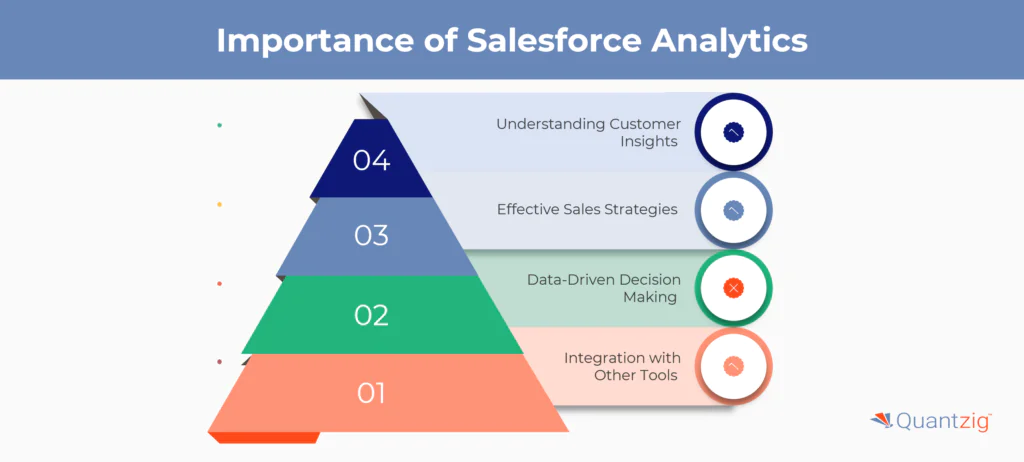
The pharmaceutical industry relies heavily on effective sales strategies to drive revenue and stay competitive. In this context, the sales force plays a pivotal role in establishing direct and personalized communication with healthcare professionals, influencing their prescribing behavior, and ultimately driving pharmaceutical sales. To achieve success, pharmaceutical companies must leverage the capabilities of Salesforce to optimize their sales strategies and maximize their investment in the salesforce.
1: Understanding Customer Insights
Understanding customer insights is crucial for effective sales interactions. Salesforce helps pharmaceutical companies gather and analyze data on healthcare professionals, including their preferences, needs, and pain points. This information enables sales representatives to tailor their approach to each customer, increasing the likelihood of successful interactions. By leveraging customer insights, pharmaceutical companies can build stronger relationships and drive revenue.
2: Effective Sales Strategies
Effective sales strategies are critical for pharmaceutical companies to succeed. Salesforce enables sales representatives to develop and implement personalized sales plans, leveraging data and analytics to optimize their approach. By focusing on high-value customers and tailoring their approach to each customer’s needs, sales representatives can increase their chances of success. Effective sales strategies also help pharmaceutical companies stay competitive in the market.
3: Data-Driven Decision Making
Data-driven decision making is essential for pharmaceutical companies to stay competitive. Salesforce provides real-time data and analytics, enabling companies to track sales performance, analyze customer behavior, and identify areas for improvement. By leveraging data insights, pharmaceutical companies can optimize their sales strategies, improve customer engagement, and drive revenue.
4: Integration with Other Tools
Integration with other tools is critical for pharmaceutical companies to streamline operations and improve efficiency. Salesforce integrates with other tools, such as marketing automation and customer service platforms, to provide a seamless customer experience. By integrating Salesforce with other tools, pharmaceutical companies can automate tasks, reduce errors, and improve customer satisfaction.
In conclusion, the effectiveness of Salesforce is paramount in the pharmaceutical industry. By leveraging the capabilities of Salesforce, pharmaceutical companies can optimize their sales strategies, build stronger relationships with healthcare professionals, and drive revenue. By understanding customer insights, developing effective sales strategies, leveraging data-driven decision making, and integrating with other tools, pharmaceutical companies can maximize their investment in the salesforce and achieve long-term success.
What are the Salesforce Analytics Tools for Pharmaceutical Industry?
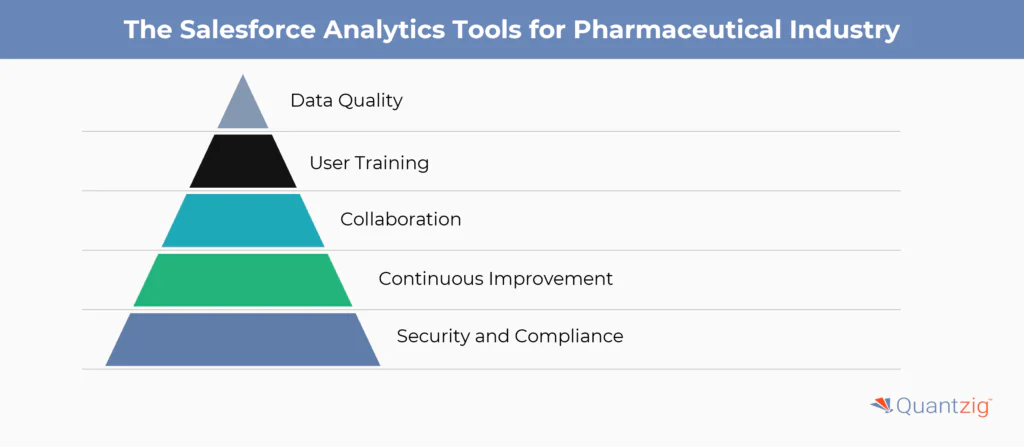
Pharma and MedTech Organizations are increasingly leveraging the Salesforce platform and its Life Sciences Cloud to achieve their digital transformation goals. By utilizing Salesforce’s Industries offering and integrating AI CRM solutions such as Einstein for Life Sciences, these organizations can enhance their sales automation functionality and optimize Healthcare Professional (HCP) Engagement. This comprehensive approach not only supports efficient management of clinical trials but also bolsters health intelligence capabilities. Through the deployment of Pharma CRM systems, healthcare and life sciences organizations can gain valuable insights and drive strategic decision-making, ultimately revolutionizing their operations.
1. Data Quality
Clean and accurate data is crucial for meaningful analysis in pharma sales. Ensure data hygiene by regularly cleaning and updating datasets to maintain accuracy and reliability, enabling more informed decision-making and targeting. This involves ensuring that data is up-to-date, complete, and consistent to support effective sales strategies.
2. User Training
Empower your sales teams with comprehensive training on Salesforce Analytics tools. Enhancing their proficiency with the platform’s features fosters adoption and ensures they leverage its full capabilities, driving productivity and efficiency in analyzing customer behavior and segmentation. This includes training on data visualization, forecasting, and whitespace analysis.
3. Collaboration
Foster a culture of collaboration between sales, marketing, and analytics teams to maximize the value of Salesforce Einstein Analytics using Self-service analytics. Sharing insights and aligning strategies across departments ensures a cohesive approach to achieving sales goals and optimizing customer engagement. This collaboration enables data-driven decision-making and strategic alignment.
4. Continuous Improvement
Embrace a mindset of continuous improvement in your analytics strategies. Regularly assess performance metrics, quality improvement, and refine your approaches to adapt to evolving market dynamics and customer preferences, staying agile and responsive in the competitive pharmaceutical landscape. This involves monitoring performance, identifying areas for improvement, and implementing changes.
5. Security and Compliance
Prioritize data security and compliance with industry regulations to safeguard sensitive pharmaceutical data using Self-service analytics. Leveraging Salesforce’s robust security features ensures the protection of your data assets, maintaining trust and integrity with healthcare professionals and stakeholders. This includes ensuring compliance with regulations such as HIPAA and GDPR.
By prioritizing data quality, user training, collaboration, continuous improvement, and security and compliance, pharmaceutical companies can maximize the value of Salesforce Analytics, driving growth and success in the competitive pharmaceutical market.
Use of Salesforce Einstein Analytics
Salesforce Einstein Analytics is a powerful tool that enables pharmaceutical companies to extract actionable insights from their data. By integrating Einstein Analytics with Salesforce, companies can gain a deeper understanding of customer behavior, sales trends, and market dynamics. This advanced analytics platform provides real-time visibility into sales performance, allowing for data-driven decision-making and strategic alignment. With Einstein Analytics, pharmaceutical companies can optimize sales pipelines, identify whitespace opportunities, and enhance customer engagement, ultimately driving business growth and competitiveness in the market.
Challenges Faced while Implementing Salesforce Analytics
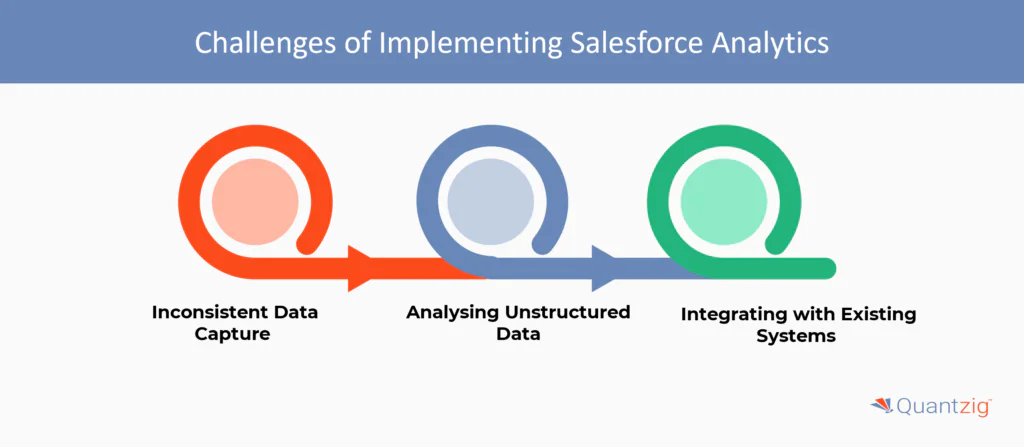
Implementing Salesforce Analytics in the pharmaceutical industry can be a complex and challenging task. The industry’s unique requirements, such as capturing nuanced qualitative data and analyzing unstructured text, present significant hurdles. In this context, understanding the challenges and developing strategies to overcome them is crucial for successful implementation.
1. Inconsistent Data Capture
The pharmaceutical industry faces challenges in capturing consistent and comprehensive data from Salesforce interactions. While quantitative metrics like visit frequency and product discussions are relatively easier to track, the nuanced qualitative aspects of these interactions, such as the content of discussions, physician reactions, and the level of persuasion achieved, are often left unrecorded due to a lack of standardized mechanisms.
2. Analyzing Unstructured Data
Even when qualitative data is captured, the analysis of unstructured data presents its own set of challenges. Extracting meaningful insights from unstructured text requires advanced natural language processing (NLP) and data analysis techniques, which may not always be readily available within a pharmaceutical salesforce environment.
3. Integrating with Existing Systems
Pharmaceutical companies often have complex IT landscapes, with multiple systems and databases in use. Seamlessly integrating Salesforce Analytics with these existing systems, ensuring data connectivity, and maintaining data integrity can be a significant challenge for organizations looking to leverage the full potential of Salesforce Analytics.
Addressing these issues is essential for optimizing salesforce effectiveness and driving informed decision-making. Implementing structured data capture mechanisms and leveraging NLP and analytics tools can help bridge this gap, enabling pharmaceutical companies to gain deeper insights from their interactions with physicians and make more informed strategic choices.
What are the Benefits of Implementing Salesforce Analytics in the Life Science Industry?
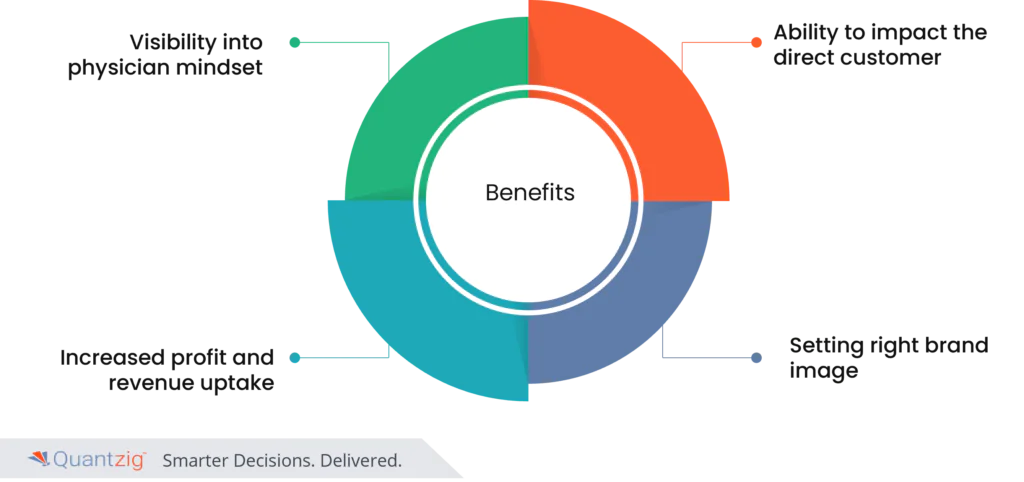
Obtaining visibility into the physician’s mindset through direct, in-person interactions is paramount for pharmaceutical companies. These interactions allow sales representatives to understand physician preferences, concerns, and clinical needs, enabling tailored communication and product positioning. This personalized approach enhances the ability to influence the physician’s prescribing decisions positively, ultimately maximizing profit and revenue uptake. Moreover, building a strong, trust-based relationship in these interactions helps set the right brand image, positioning the pharmaceutical company as a reliable partner in healthcare. In essence, the in-person connection with physicians serves as a strategic cornerstone for achieving financial success and a positive brand reputation in the pharmaceutical industry.
Experience the advantages firsthand by testing a customized complimentary pilot designed to address your specific requirements. Pilot studies are non-committal in nature.
Request a Free PilotWhat are the Strategies for Pharma Sales Success?
In the highly competitive landscape of pharma sales, leveraging data-driven insights and advanced analytics is paramount for success. Harnessing the power of AI and machine learning, Salesforce Einstein Analytics empowers pharmaceutical companies to optimize their sales strategies and drive growth by understanding and engaging with healthcare professionals more effectively.
1. Segmentation and Targeting:
Pharma sales teams can effectively segment their target audience using Salesforce Analytics, leveraging factors such as prescribing behavior, therapy area interests, and geographical location. This granular segmentation enables personalized communication and tailored offerings, ensuring relevance and resonance with each segment of healthcare professionals.
2. 360-Degree Customer View:
By integrating data from various touchpoints into CRM tools like Salesforce, pharma sales teams gain a comprehensive view of each customer. This holistic understanding enables representatives to tailor their approach based on individual preferences, past interactions, and prescribing patterns, fostering more meaningful and productive engagements.
3. Predictive Analytics:
Salesforce Analytics empowers pharma sales teams with predictive analytics capabilities to forecast trends, identify high-value customers, and anticipate market shifts. By leveraging historical data and AI-powered algorithms, companies can optimize resource allocation and proactively design strategies to stay ahead of the competition.
4. Real-Time Insights:
With Salesforce Analytics, sales teams have access to real-time dashboards and reports, providing instantaneous insights into sales performance. Monitoring key performance indicators (KPIs) such as conversion rates, territory performance, and product uptake allows for agile decision-making and swift adjustments to tactics and strategies as needed.
In summary, Salesforce Einstein Analytics equips pharma sales teams with the tools and insights necessary to drive success in a rapidly evolving market. From segmentation and targeting to predictive analytics and real-time monitoring, Salesforce Analytics enables pharmaceutical companies to stay ahead of the curve, maximize sales effectiveness, and deliver value to their target audience.
What are the Best Practices to Maximize Salesforce Analytics in the Life Science Industry?
1. Data Quality:
Clean and accurate data is paramount for meaningful analysis in pharma sales. Ensure data hygiene by regularly cleaning and updating your datasets to maintain accuracy and reliability, enabling more informed decision-making and targeting.
2. User Training:
Empower your sales teams with comprehensive training on Salesforce Analytics tools. Enhancing their proficiency with the platform’s features fosters adoption and ensures they leverage its full capabilities, driving productivity and efficiency in analyzing customer behavior and segmentation.
3. Collaboration:
Foster a culture of collaboration between sales, marketing, and analytics teams to maximize the value of Salesforce Einstein Analyticsusing Self-service analytics. Sharing insights and aligning strategies across departments ensures a cohesive approach to achieving sales goals and optimizing customer engagement.
4. Continuous Improvement:
Embrace a mindset of continuous improvement in your analytics strategies. Regularly assess performance metrics, Quality improvement and refine your approaches to adapt to evolving market dynamics and customer preferences, staying agile and responsive in the competitive pharmaceutical landscape.
5. Security and Compliance:
Prioritize data security and compliance with industry regulations to safeguard sensitive pharmaceutical data using Self-service analytics. Leveraging Salesforce’s robust security features ensures the protection of your data assets, maintaining trust and integrity with healthcare professionals and stakeholders.
In summary, by prioritizing Self-service analytics, data quality, user training, collaboration, continuous improvement, and security and compliance, pharmaceutical companies can maximize the value of Salesforce Analytics, driving growth, and success in the competitive pharmaceutical market.
Potential Use Cases of Salesforce Einstein Analytics for the Pharma Industry

Salesforce Einstein Analytics, powered by AI and machine learning, offers unparalleled capabilities for advanced analytics on CRM data, empowering pharmaceutical companies with data-driven insights to drive organizational success. Here’s how Salesforce Einstein Analytics can revolutionize operations in the Pharma industry:
1. Enhanced Performance:
In the fiercely competitive Pharma industry, achieving sales targets efficiently is paramount. With Salesforce Einstein Analytics, sales personnel gain real-time visibility into the pipeline, allowing for prompt identification of performance gaps and opportunities. By leveraging AI-powered insights, sales managers can recognize high-performing reps, replicate winning strategies, and optimize sales performance across the organization. Additionally, unstructured market data can be integrated to provide valuable competitive intelligence, informing strategic decisions, Quality improvement and enhancing market penetration.
2. Pipeline Optimization:
Salesforce Einstein Analytics enables sales agents to understand pipeline dynamics in real-time, facilitating proactive management of opportunities. By analyzing changes in the pipeline, reps can identify missed opportunities early, nurture leads effectively, and ensure continuous progress towards sales goals. This capability is particularly valuable in the Pharma industry, where sales cycles are often lengthy, enabling reps to maintain engagement with prospects and drive conversions.
3. Forecasting:
Accurate forecasting is essential for planning successful drug launches and sales strategies using Social listening tools. Salesforce Einstein Analytics empowers sales teams to forecast sales and revenue accurately, providing comprehensive dashboards for informed decision-making. By anticipating market trends and sales opportunities, Pharma companies can optimize resource allocation and set realistic sales targets, driving revenue growth and market share expansion.
4. Whitespace Analysis:
Salesforce Einstein Analytics simplifies whitespace analysis, enabling Pharma companies to identify untapped market opportunities and target audiences overlooked by competitors. By analyzing complex data sets, organizations can identify cross-selling opportunities, optimize product offerings, and enhance market penetration strategies. Leveraging social listening tools, such as Twitter and Facebook, further enriches market intelligence, enabling companies to monitor product feedback, track competitor performance, and identify quality improvement opportunities.
In summary, Salesforce Einstein Analytics empowers Pharma companies to optimize sales performance, Market intelligence, streamline pipeline management, enhance forecasting accuracy, and capitalize on whitespace opportunities, using various Social listening tools, ultimately driving growth and competitiveness in the dynamic Pharma landscape.
Quantzig’s Expertise in Pharma Salesforce Analytics for a Leading US-Based Pharmaceutical Company
| Category | Details |
|---|---|
| Client Details | A leading pharmaceutical company located in the USA with annual revenue of $10bn+. |
| Challenges Faced by The Client | The client struggled with inefficiencies in sales force management, including frequent vacancies, slow decision-making, and intuition-based decisions, leading to suboptimal resource allocation and lower-than-expected ROI. |
| Solutions Offered by Quantzig | Quantzig developed a comprehensive Vacancy Management Framework that utilized data-driven risk assessment and prioritization strategies to evaluate and address the impact of sales force vacancies. This approach streamlined territory refilling, ensuring timely and strategic decisions that optimized resource allocation and maximized ROI. |
| Impact Delivered | 2x faster decision-making about refilling of vacancy backed by data 10% increase in ROI through timely refilling of territory Increased customer engagement |
Impact Delivered from Quantzig’s Salesforce Analytics
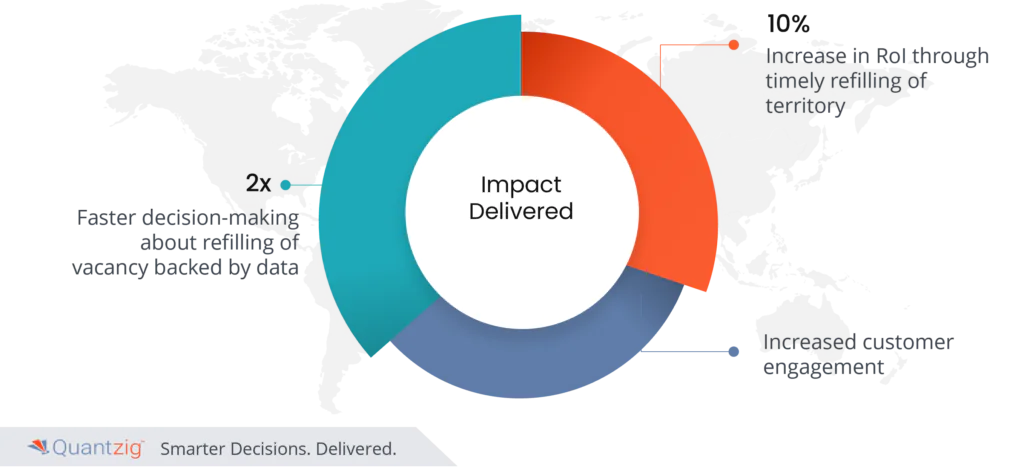
- 2x faster decision-making about refilling of vacancy backed by data;
- 10% increase in RoI through timely refilling of territory;
- Increased customer engagement
Get started with your complimentary trial today and delve into our platform without any obligations. Explore our wide range of customized, consumption driven analytical solutions services built across the analytical maturity levels.
Start your Free TrialConclusion
In conclusion, the integration of Pharma Salesforce Analytics within the pharmaceutical and life sciences sectors represents a transformative leap toward optimizing sales force effectiveness. By harnessing the power of data-driven insights, these industries can enhance their engagement with physicians, personalize their marketing strategies, and make informed decisions that lead to improved revenue and brand reputation. Analytics not only unlocks the potential for more efficient resource allocation but also ensures a more profound and lasting impact on healthcare professionals. In an era where knowledge is power, Salesforce Analytics emerges as the beacon guiding pharmaceutical and life sciences companies toward a brighter, more prosperous future.


